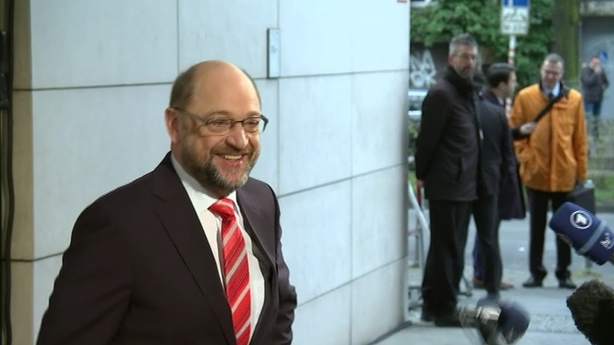German Chancellor Angela Merkel has said she is "optimistic" going into exploratory talks with the Social Democrats (SPD), whose leader Martin Schulz said his party would not draw any red lines at the start of discussions.
Ms Merkel is still attempting to form a new government, more than three months after a German election took place.
Ms Merkel's conservative bloc and the SPD have scheduled five days of talks to see if they can find enough common ground to form another "grand coalition" that has governed Germany for the last four years.
Horst Seehofer, leader of the Christian Social Union (CSU) - the Bavarian sister party to Merkel's Christian Democrats (CDU) - said he was going into the talks in "high spirits" and said the parties needed to come to an agreement.
Enticing the SPD to team up with her is Ms Merkel's best chance of forming a stable government and extending her 12-year tenure, after her efforts to form an alliance with two smaller parties, the Free Democrats and the Greens, failed last year.
The SPD vowed to go into opposition after its worst election showing since 1933 but reconsidered when the president intervened.

Opposition to such a tie-up is strong in the SPD - a group called "NoGroKo", meaning "no grand coalition", has formed within its ranks to campaign against working with Ms Merkel again, saying that would cost the SPD votes.
"We shouldn't make things sound better than they are – the SPD is very sceptical about a re-run of the grand coalition," senior SPD member Manuela Schwesig said.
The grand coalition idea - usually a last resort as it leaves the opposition small - is unpopular, with a poll showing more than half (52%) of Germans are sceptical, while 45% are in favour.
The parties will likely clash on immigration, tax, healthcare and Europe.
Volker Bouffier, a senior member of Ms Merkel's Christian Democrats (CDU), said his party intended to form a grand coalition.
But he added: "Whether that will succeed is yet to be seen. It can't happen at any price."
SPD parliamentary leader Andrea Nahles sounded a conciliatory note, saying she would not draw any red lines ahead of the talks.
She said: "Negotiations mean you don't get 100% of your own demands fulfilled."
If the talks prove successful, a new government will likely be in place by Easter, she said.
The potential partners have agreed on a news blackout during exploratory talks, which are due to finish on Thursday.
If they find enough common ground and the SPD gets backing from its members in a vote, the parties will proceed to full-blown coalition talks.
But if the discussions fail, Europe's largest economy could either face fresh elections or, for the first time in the post-war era, a minority government under Ms Merkel.

